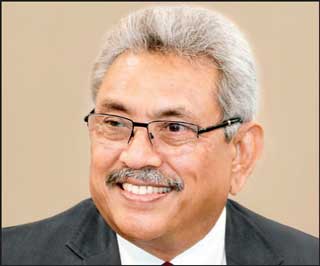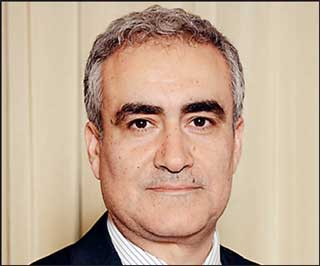Saturday Feb 21, 2026
Saturday Feb 21, 2026
Friday, 13 May 2022 00:00 - - {{hitsCtrl.values.hits}}
 |
| President Gotabaya Rajapaksa |
 |
| ICJ Secretary General Sam Zarifi
|
The International Commission of Jurists (ICJ) said yesterday the Sri Lankan Government must immediately revoke emergency regulations that give security forces extensive powers of search,detention, prosecution and punishment.
Sri Lankan President Gotabaya Rajapaksa following the declaration of a state of emergency last week unveiled yesterday a new set of emergency regulations after the resignation of his brother Mahinda Rajapaksa as Prime Minister, in response to the ongoing and widespread protests against his Government and the country’s worst-ever economic crisis.
These regulations give the President, security personnel and other officials appointed by the President significant executive powers of control and surveillance, set up a parallel administrative system and needlessly augment sanctions for ordinary penal offences.
ICJ said Sri Lanka is bound as a party to the International Covenant on Civil and Political Rights to respect a range of rights, including among others the right to liberty, freedom of expression and freedom of assembly. Where there is a genuine state of emergency that threatens the life of the nation, states may temporarily restrict the scope of application of certain rights. Sri Lanka does not appear to have formally derogated from any provision ICCPR, as would be required for such exceptional measures.
In any event, any derogating must be temporary strictly necessary to meet a specific threat to the life of a nation and proportionate to that end. Many of the emergency regulations plainly do not pass this test, which has been affirmed repeatedly by the UN Human Rights Committee and reflected in the Siracusa Principles on the Limitation and Derogation Provisions in the International Covenant on Civil and Political Rights.
On Wednesday, Defence Ministry ordered the armed forces to shoot at persons causing harm to life or involved in theft of property following the spate of violence and arson attacks on the houses of Parliamentarians belonging to the ruling party.
“These emergency regulations, along with the alarming ‘shoot to kill’ orders issued by the military against any protesters damaging property, could have disastrous human rights consequences in a country that is already in a deep political and economic crisis,” said ICJ Secretary General Sam Zarifi.
“The regulations relating to freedoms of assembly and expression are overbroad and disproportionate and is evidently being put in place to stifle ongoing protests against the President,” he added.
The ICJ condemns the delegation of extensive powers given to the police and army in relation to search, arrest, and detention, as provided by the emergency regulations, which are breach of rule of law principles.
According to the regulations, a suspect need not be produced before a magistrate for as long as 14 days if the detention order is issued by a Deputy Inspector General of Police. Further, such persons can be removed from a place of detention and kept in the temporary custody of a questioning officer up to seven days at a time without judicial supervision or control. This is in clear violation of Article 9 of the ICCPR and makes such suspects vulnerable to torture and other ill-treatment.
Moreover, not only has bail been made an exception, but conditional release of offenders on the grounds of age, mental condition or trivial nature of the offence provided for under the Criminal Procedure Code no longer apply. These regulations therefore allow for arbitrary detention, in violation Sri Lanka’s international legal obligations.
A number of offences ranging from kidnapping to sexual harassment, human trafficking and “unnatural offences” – typically understood as the criminalisation of same-sex sexual activity – have been listed under these regulations with enhanced punishment.
“While it is unclear why these types of offences have been brought under the emergency regulations, the real-world implications of these provisions could lead to increased harassment of people who are already marginalised, for instance members of the LGBTI community,” Zarifi added.